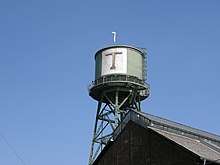Ruhrtriennale
The Ruhrtriennale (compound of Ruhr and triennale "lasting 3 years") also known as Ruhr Triennale,[1] was founded in 2002 and is a music and arts festival in the Ruhr-area of Germany which runs between mid-August and mid-October, and happens in three-year cycles.[1] The topics of the festival focus on contemporary social and global upheavals.

History
It was founded in 2002 by the government of North Rhine-Westphalia with Gerard Mortier, the impresario and former artistic director of the Salzburg Festival, as its founding director.[1] The festival is organized into three-year cycles, each with its own theme and under different artistic directors.
Each yearly festival comprises 80 performances of 30 productions. Its central feature are the Kreationen (creations) – interdisciplinary productions uniting contemporary developments in fine art, pop, jazz and concert music. Another continuous element is the concert series, Century of Song, dedicated to the art of songwriting. The locations of the Ruhrtriennale are industrial heritage sites of the Ruhr area, which have been transformed into venues for music, theatre, literature and dance.[2] The festival's main hall is the Jahrhunderthalle, a former early-20th-century power station in Bochum. Other locations include the Zeche Zollverein colliery in Essen, the Landschaftspark Duisburg-Nord and the Maschinenhalle Zweckel in Gladbeck.
Artists who have appeared at the festival include Ariane Mnouchkine, Peter Brook, Bill Viola, Patrice Chéreau, Ilya Kabakov, Peter Sellars, Christian Boltanski, Bill Frisell, Patti Smith, Elvis Costello, Akram Khan, Cecilia Bartoli, Michal Rovner (2012),[3] and Thomas Hampson.
Cycles and directors
| Dates | Director(s) | Theme | Notes |
|---|---|---|---|
| Fall 2002– Spring 2004 | Gerard Mortier | [1] | |
| 2005–2007 | Jürgen Flimm | Industrialization and arts movements | took as its theme the relationship between industrialisation and the arts, focusing in successive years on the Romantic, Baroque, and Medieval-eras. The center piece was a new production of Bernd Alois Zimmermann's opera Die Soldaten, which later travelled to New York.[2] Following the death in 2007 of Marie Zimmermann, the appointed director for the 2008 to 2010 seasons,[4] Jürgen Flimm, stayed on as artistic director for another year. The 2008 theme was Aus der Fremde (From abroad). |
| 2009–2011 | Willy Decker | Urmomente (Primal moments) | Its central theme Urmomente (Primal moments), describes the relationship between creativity and religion, focusing in successive years on Jewish, Islamic, and Buddhist culture. |
| 2012–2014 | Heiner Goebbels | ||
| 2015–2017 | Johan Simons | Seid umschlungen (Be embraced) | theme Seid umschlungen (be embraced) from Schiller's "Ode to Joy", as "a gesture of social, political and geographical embracement". |
| 2018–2020 | Stefanie Carp and Christoph Marthaler.[5] | Stefanie Carp is the first female director of the festival.[5] |
References
- Rockwell, John (2003-05-15). "Tempting Audiences To German Rust Belt; Ruhr Triennale Flouts Tradition". The New York Times. ISSN 0362-4331. Retrieved 2020-03-10.
- Wakin, Daniel J. (2008-07-04). "The Brutality of War, on a Big Stage". The New York Times. ISSN 0362-4331. Retrieved 2020-03-10.
- "MICHAL ROVNER - CURRENT / Ruhrtriennale 2012". YouTube. Ruhrtriennale.
- "In Memoriam: Marie Zimmermann (1955 – 2007)". The Vienna Review. 2007. Retrieved 2020-03-10.
- "Die neue Intendantin Stefanie Carp ist neugierig auf die Region" by Dieter Nellen. Ruhr Nachrichten, 6 March 2018 (in German)
External links
- Official website
- Ruhr Triennale, Chronology